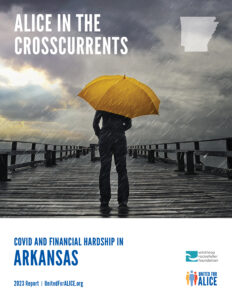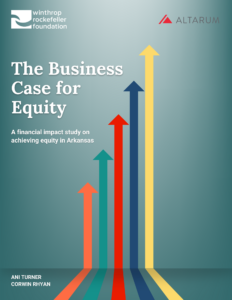INSIGHTS
ABCs of Equity Reports
ALICE in the Crosscurrents: COVID and Financial Hardship in Arkansas
Arkansas households unable to afford the basics have grown to 551,925 families — nearly half of the state’s population. That’s a 6% increase from 2017 and a 1% increase from 2019 to 2021, according to a report from the Winthrop Rockefeller Foundation and its research partner United For ALICE.AR.
The report finds that while job disruptions and inflation delivered significant financial pain, tax credits and other pandemic supports helped to curb a deeper financial crisis.
ALICE In Arkansas
Nearly one out of two households — 46 percent of Arkansans — are either below the federal poverty level or have incomes that cause families to struggle to afford housing, childcare, food, transportation, and healthcare.
ALICE in Arkansas is a groundbreaking study sponsored by Entergy Arkansas and the Winthrop Rockefeller Foundation that reveals the scope of financial hardship in Arkansas. ALICE in Arkansas was released in March 2020 before the COVID-19 pandemic.
The Business Case for Economic Equity in Arkansas
If Arkansas households earned at least the ALICE survival budget, Arkansas would benefit from $8.4 billion more in taxable wages and $6.9 billion more in consumer spending, resulting in a $2.2 billion net gain for the state budget.
The Business Case for Economic Equity in Arkansas is a research brief completed by nonprofit research firm Altarum that demonstrates the economic benefits of eliminating inequities experienced by Arkansas’s workforce.
Capital Access Report
If Arkansas households earned at least the ALICE survival budget, Arkansas would benefit from $8.4 billion more in taxable wages and $6.9 billion more in consumer spending, resulting in a $2.2 billion net gain for the state budget.
The Business Case for Economic Equity in Arkansas is a research brief completed by nonprofit research firm Altarum that demonstrates the economic benefits of eliminating inequities experienced by Arkansas’s workforce.
WRF uses data to inform decision-making, build engagement, leverage resources and track our impact across the state. We believe data-informed strategies have the potential to increase equity in access, opportunities, and outcomes in Arkansas for years to come.




